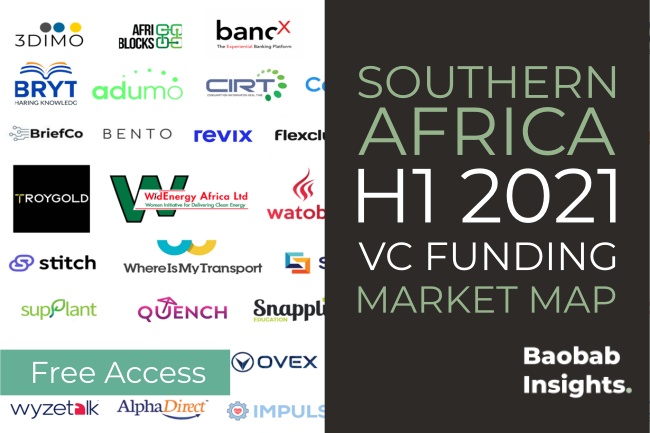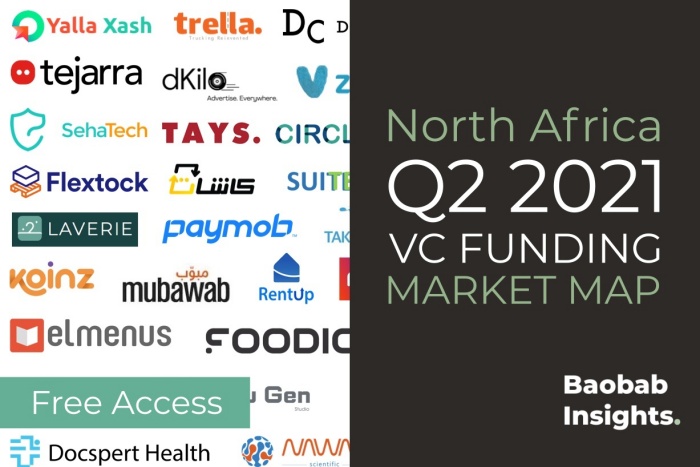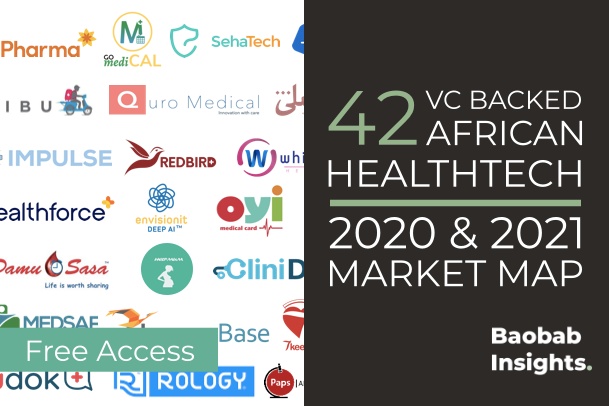Precision Agriculture – Africa Market Map
40 Precision Agriculture Companies
The UN forecasts that the population of Africa will reach 2.4 billion by 2050. This presents a significant challenge for governments, farmers and the private sector to increase levels of farming productivity and match increased food demand. Meeting this need will come from a variety of stakeholders and changes to government policy. However, technology has always played a significant role in solving food security challenges, and increasingly it is digital technology, or precision agriculture, that may have a larger role to play.
Precision Agriculture refers to the use of technology solutions to help capture and analyse data sources to improve farming processes, yields and profitability. By capturing information from a variety of sources such as; soil type, nutrient and moisture levels, or topography, is useful for optimising profitability, sustainability and protecting local environments.
Precision Agriculture has the potential to contribute to various types of farming operations through the use of drone technology, IoT and vertical farming. These tools and techniques are made accessible through cloud-based web and mobile applications. Helping to extend their use-case directly to the field. For small-holder farmers, a demographic which according to the ODI represents 80% of farms in the sub-Saharan Africa, the potential of such technologies could be significant in helping to increase productivity, and access to vital agronomic information.
Following the announcement that the team at Aerobotics closed their Series B round in December 2020, and New York and Nairobi based Gro Intelligence announcing in January 2021, that they have closed an $85.0. million USD Series B, the Baobab Insights team were keen to take a closer look at this innovative space.
40 Innovators in Africa’s Precision Agriculture Market
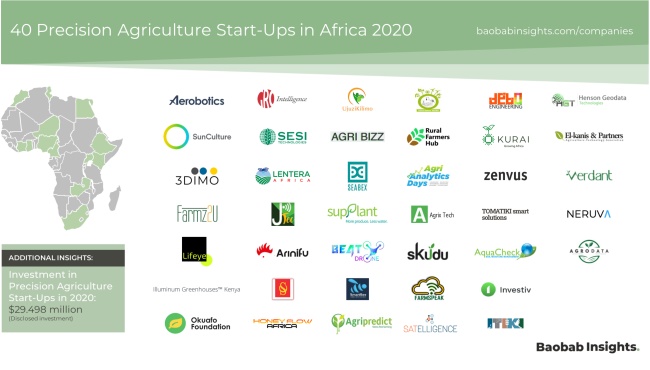 Source: Baobab Insights, (2020 year to date as of 17/12/2020)
Source: Baobab Insights, (2020 year to date as of 17/12/2020)
Are we missing anyone?
Submit Startup
Analysis of Baobab Insights companies database highlighted 40 innovative start-ups across Africa providing various precision farming technologies and services. While the company’s headquarters were spread across a dozen African countries, 50% of company are headquartered in either Nigeria (8), Kenya (7) and South Africa (5).
Drone technology was found to be leveraged by at least eight different start-ups, including Aerobotics who are using aerial imagery and machine learning algorithms to help farmers identify pest and diseases early.
The use of computer vision, which was a common trend among many of the precision agriculture start-ups, is also utilised on the ground as well as in the air. For example, Agrix Tech is a Cameroon based AgTech using machine learning and artificial intelligence to diagnose crop diseases through smartphone cameras. South African based 3Dimo focus their computer vision technology on livestock, utilising a biometric identification system to track the medical history and health of cattle.
Affordable solutions have also been developed to meet the needs of small-holder farmers, including soil testing services to help select optimal crop and fertilisers (UjuziKilimo), weather and drought information distributed by SMS to help farmers plan their harvest (ITIKI) and water usage analysis through IoT technology to ensure efficient irrigation systems (Tele-Irrigation).
Figure 1: Graph Showing Investment into Precision Agriculture Companies since 2015
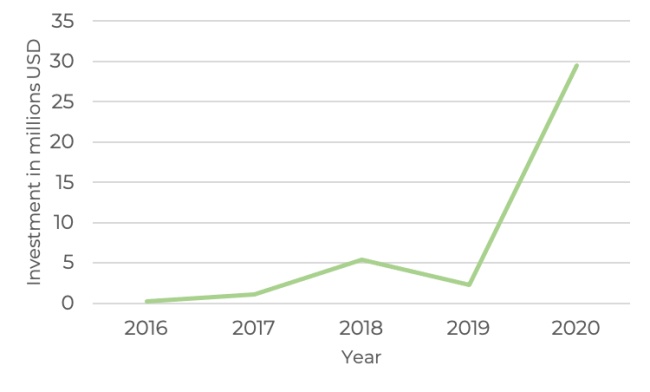


Source: Baobab Insights, (2020 year to date as of 31/12/2020)
A Record Year of Investment in 2020
While precision agriculture has an important role to play in terms of food security in Africa, it also offers commercially viable business models for investors to back. In fact, 2020 proved to be a record year in terms of disclosed venture capital, prize and grant money invested into the sector, reaching a total of $29.5 million dollars and surpassing the previous 4 years combined.
Momentum during 2020 was also seen in the launch of the first African Conference of Precision Agriculture (AfCPA) with the mission to “connect the science and practice needed to put precision agriculture in action for Africa”, along with Microsoft’s notable partnership with The Nigeria Incentive-based Risk Sharing System for Agricultural Lending (NIRSAL) in the deployment of the Microsoft Azure FarmBeats platform.
The impetus to scale precision agriculture solutions in Africa is evident, and it will be interesting to see how the market evolves over 2021 to continue to meet the growing demand for solutions across Africa.
FREE ACCESS: Download 40 Precision Agriculture: Africa Market Map
Download Market Map
FREE ACCESS: Download 40 Precision Agriculture: Africa Market Map
Download Market Map
Contact the authors for more information about our Insight
Precision Agriculture – Africa Market Map
40 Precision Agriculture Companies
The UN forecasts that the population of Africa will reach 2.4 billion by 2050. This presents a significant challenge for governments, farmers and the private sector to increase levels of farming productivity and match increased food demand. Meeting this need will come from a variety of stakeholders and changes to government policy. However, technology has always played a significant role in solving food security challenges, and increasingly it is digital technology, or precision agriculture, that may have a larger role to play.
Precision Agriculture refers to the use of technology solutions to help capture and analyse data sources to improve farming processes, yields and profitability. By capturing information from a variety of sources such as; soil type, nutrient and moisture levels, or topography, is useful for optimising profitability, sustainability and protecting local environments.
Precision Agriculture has the potential to contribute to various types of farming operations through the use of drone technology, IoT and vertical farming. These tools and techniques are made accessible through cloud-based web and mobile applications. Helping to extend their use-case directly to the field. For small-holder farmers, a demographic which according to the ODI represents 80% of farms in the sub-Saharan Africa, the potential of such technologies could be significant in helping to increase productivity, and access to vital agronomic information.
Following the announcement that the team at Aerobotics closed their Series B round in December 2020, and New York and Nairobi based Gro Intelligence announcing in January 2021, that they have closed an $85.0. million USD Series B, the Baobab Insights team were keen to take a closer look at this innovative space.
40 Innovators in Africa’s Precision Agriculture Market



Are we missing anyone?
Submit Startup
Analysis of Baobab Insights companies database highlighted 40 innovative start-ups across Africa providing various precision farming technologies and services. While the company’s headquarters were spread across a dozen African countries, 50% of company are headquartered in either Nigeria (8), Kenya (7) and South Africa (5).
Drone technology was found to be leveraged by at least eight different start-ups, including Aerobotics who are using aerial imagery and machine learning algorithms to help farmers identify pest and diseases early.
The use of computer vision, which was a common trend among many of the precision agriculture start-ups, is also utilised on the ground as well as in the air. For example, Agrix Tech is a Cameroon based AgTech using machine learning and artificial intelligence to diagnose crop diseases through smartphone cameras. South African based 3Dimo focus their computer vision technology on livestock, utilising a biometric identification system to track the medical history and health of cattle.
Affordable solutions have also been developed to meet the needs of small-holder farmers, including soil testing services to help select optimal crop and fertilisers (UjuziKilimo), weather and drought information distributed by SMS to help farmers plan their harvest (ITIKI) and water usage analysis through IoT technology to ensure efficient irrigation systems (Tele-Irrigation).
Figure 1: Graph Showing Investment into Precision Agriculture Companies since 2015



Source: Baobab Insights, (2020 year to date as of 31/12/2020)
A Record Year of Investment in 2020
While precision agriculture has an important role to play in terms of food security in Africa, it also offers commercially viable business models for investors to back. In fact, 2020 proved to be a record year in terms of disclosed venture capital, prize and grant money invested into the sector, reaching a total of $29.5 million dollars and surpassing the previous 4 years combined.
Momentum during 2020 was also seen in the launch of the first African Conference of Precision Agriculture (AfCPA) with the mission to “connect the science and practice needed to put precision agriculture in action for Africa”, along with Microsoft’s notable partnership with The Nigeria Incentive-based Risk Sharing System for Agricultural Lending (NIRSAL) in the deployment of the Microsoft Azure FarmBeats platform.
The impetus to scale precision agriculture solutions in Africa is evident, and it will be interesting to see how the market evolves over 2021 to continue to meet the growing demand for solutions across Africa.

